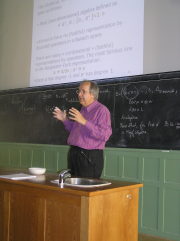
Conference Tutorials
Tutorials can be proposed in the following three categories:
* T1- Introductory Tutorials
* T2- State of the Art Tutorials
* T3- Software and Modelware Tutorials
Tutorial proposals should be emailed to Philippe.Geril@eurosis.org, by indicating the type of tutorial you would like to suggest. (T1, T2 or T3) before February 28, 2009. When preparing a tutorial submission, please consider the suggested template (to be linked later). A confirmation email will be sent to verify that the proposal was received.
Examples of topic areas for tutorial proposals should mirror the topics in the list of conference themes and workshops.
Proposals must be submitted electronically via e-mail, as plain text or in PDF. The tutorial submission should be contained within five pages. Various parts of the proposal for accepted tutorials may be edited for incorporation in the Advance Program.
Financial Terms
An accepted conference tutor receives a free conference registration plus a free publication of his tutorial paper. Tutorial presenters will receive also an honorarium depending on the number of attendees registering specifically for the tutorial outside the conference registrants. The precise amount of the honorarium will be determined immediately after the early registration deadline.
Tutorials that have less than 8 early registrants will face the risk of cancellation.
Tutorial Selection Committee
The proposals received will be reviewed by the Selection Committee to ensure a high quality and appropriate mix for the conference. The goal of the Selection Committee is to provide a diverse set of tutorials that attract a large interest among the broad segments within the diverse simulation community.

|
Gérard H. E. Duchamp |
Dynamic combinatorics, complex systems and applications to physics
Abstract
We focus our attention for this seminar on some innovative works on emergence computation from interaction networks which are nowadays powerful tools for modeling complexity. A special care will be addressed to dynamic structures which motion can follow some properties and/or can be in correspondence to some enumerative patterns. The associated evolutionary systems which can be modeled by these structures, are often built on elementary transition rules and lead to emergent properties. The goal is to find a better understanding of evolvable complex systems by these methodologies. Applications of dynamic structures will be given in physics.
Outline:
- Transition systems (finite and infinite) examples will be taken from Computer Sciences and Quantum Physics
- Variations on coefficients : semirings
- Rationality, matrices and paths
- Distances, Control and genetic algorithms
- Collective modelling (communities, schelling etc...)
Biography
Professor Gérard H.E. Duchamp is one of the founders of the series of congresses FPSAC. Born in 1951 (Paris, France), he took his studies and degrees in the region of Ile de France and began trainer for the competitive examinations of "Grandes écoles". He received his Ph. D. and Habilitation from Paris-Jussieu University under the direction of Dominique Perrin and Marcel Paul Schützenberger (a member of the French Academy of Sciences), both founders of the french school of Theoretical Computer Science. Pr. G. H. E. Duchamp's interests cover essentially the interplay between computation and the other areas of knowledge. His publications cover many domains where computation is involved such as: Automata Theory, Lie algebras, Quantum groups, Combinatorics (he made a video on the subject with Xavier Viennot), Computer algebra, Representation Theory and Quantum Physics.











